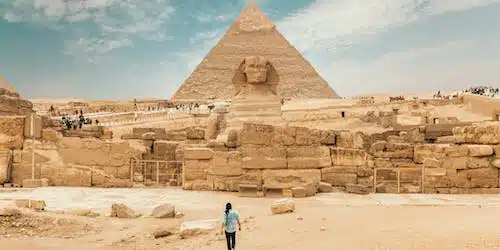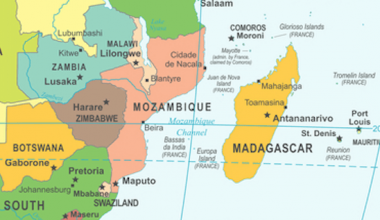Get ready for an enchanting adventure when traveling to Egypt, where every step unveils the mysteries of Egypt’s storied past. Egypt offers a variety of experiences for travelers, including historical sites, Nile River cruises, desert adventures, Red Sea diving, beautiful beaches, cultural experiences, and friendly locals. Its rich history, natural beauty, and warm hospitality make it an attractive destination for history enthusiasts, adventure seekers, and art lovers. However, caution is advised to avoid scams and tourist traps. In this article, we have compiled some valuable information about traveling to Egypt, including requirements needed to travel, places to visit, benefits, and tips that will help you navigate your way easily.
Traveling To Egypt
Traveling to Egypt offers a wide range of experiences and attractions for travellers. The ancient country offers natural beauty, cultural treasures, and warm hospitality. It’s a destination that appeals to history enthusiasts, adventure seekers, art lovers, and those simply looking to unwind and soak in the beauty of this remarkable country.
Things To Know When Traveling To Egypt
#1. Historical Sites
Egypt is famous for its ancient historical sites, including the Pyramids of Giza, the Sphinx, and the Valley of the Kings. These iconic landmarks provide a glimpse into the country’s rich history and ancient Egyptian civilization.
#2. Nile River Cruises
A Nile River cruise is a popular way to explore Egypt’s cultural and historical treasures. Travelers can enjoy breathtaking views of the river and visit ancient temples and archaeological sites along the way.
#3. Desert Adventures
Egypt’s deserts offer unique experiences, such as exploring the vast Sahara Desert, visiting oases, and camping under the stars. Travellers can also hike to the top of Mount Sinai for stunning views.
#4. Red Sea Diving
Egypt is a popular destination for scuba diving and snorkelling enthusiasts. The Red Sea is known for its vibrant coral reefs, diverse marine life, and crystal-clear waters. Dahab, Sharm El Sheikh, and Hurghada are some of the top diving spots.
#5. Beaches and Resorts
Egypt boasts beautiful beaches along its coastline, including the Mediterranean Sea and the Red Sea. Popular resort towns like Hurghada, Sharm El Sheikh, and Marsa Alam offer luxurious accommodations, water sports, and relaxation opportunities.
#6. Cultural Experiences
Travelers can immerse themselves in Egyptian culture by visiting bustling markets like Khan El Khalili in Cairo, trying traditional Egyptian cuisine, and attending cultural festivals and events.
#7. Friendly People
Egypt is known for its warm hospitality, and many travelers have positive experiences interacting with the locals. However, it’s important to be cautious and aware of common scams and tourist traps.
#8. Museums and Art
Egypt is home to world-class museums that showcase the country’s rich history and art. The Egyptian Museum in Cairo houses an extensive collection of ancient artefacts, including the treasures of Tutankhamun. Additionally, Egypt has a vibrant contemporary art scene, with galleries and exhibitions in major cities.
#9. Islamic and Coptic Heritage
Egypt has a significant Islamic and Coptic Christian heritage. Travelers can explore stunning mosques like the Alabaster Mosque in Cairo and the Mosque of Ibn Tulun. The Coptic Cairo district is home to ancient Coptic churches, including the Hanging Church and the Coptic Museum.
#10. Cruise the Lake Nasser
Lake Nasser, formed by the Aswan High Dam, offers a unique cruising experience. Travelers can enjoy the serene beauty of the lake, visit temples relocated during the dam’s construction, and witness the impressive Abu Simbel temples.
Traveling To Egypt Is It Safe
When considering the safety of traveling to Egypt, it’s important to take into account various factors. This is the safety situation in Egypt:
#1. Terrorism
Egypt faces a threat of terrorism, and terrorist groups continue to plot attacks in the country. They have targeted diplomatic facilities, tourist locations, transportation hubs, markets, western businesses, restaurants, resorts, and religious sites. Attacks have occurred in urban areas, including Cairo, despite the heavy security presence.
#2. Safety in Specific Regions
The situation in Egypt can vary across different regions. While popular tourist destinations like Cairo, Alexandria, Luxor, Aswan, and Hurghada are generally considered safe, areas like the West Desert, Abu Simbel, and Sinai can be more unpredictable.
#3. Civil Unrest
Egypt has experienced periods of civil unrest in the past. It’s advised to stay updated on the current political situation and follow any travel advisories issued by your government.
#4. Scams and Theft
Egypt has instances of scams and theft. Travelers should be cautious of pickpocketing, scams targeting tourists, and unauthorised guides. It’s advisable to be aware of your belongings, use reputable tour operators, and exercise caution when dealing with strangers.
#5. Proximity to Conflict Areas
Egypt shares borders with countries that have experienced conflicts, such as Libya and Sudan. While the main tourist areas in Egypt are generally safe, it’s important to be aware of the proximity to these conflict zones and any potential spillover effects.
#6. Political Demonstrations
Egypt has experienced political demonstrations and protests in the past. While these events are usually localised and peaceful, it’s recommended to avoid participating in or being near such gatherings.
#7. Women’s Safety
Women travelers should take extra precautions when traveling alone in Egypt. It’s advisable to dress modestly, avoid walking alone at night, and be cautious of unwanted attention. Traveling in groups or with a reputable tour operator can enhance safety.
#8. Personal Safety Precautions
Travelers should take general safety precautions while in Egypt. It’s advisable to remain vigilant, especially in crowded areas, and be aware of your surroundings. It’s also recommended to follow any guidance or instructions provided by local authorities or tour operators.
#9. Health Considerations
Travelers should be aware of customs regulations, such as restrictions on the importation of electronics and the prohibition of exporting antiquities without a licence. Follow food and water safety guidelines, such as consuming freshly prepared cooked food, avoiding uncooked food, and drinking bottled water or boiled and filtered water.
#10. Natural Disasters
Egypt is susceptible to natural disasters such as earthquakes and sandstorms. Stay informed about any potential risks and follow the guidance of local authorities in case of any natural disasters or severe weather conditions.
Traveling To Egypt Requirements
When traveling to Egypt, there are several requirements. These requirements include
#1. Passport
Ensure that your passport is valid for at least six months from the date of arrival in Egypt. Most travelers will need a visa to enter
#2. Visa Application
Most travelers will need a visa to enter Egypt. The visa requirements vary depending on your nationality. Check with the nearest Egyptian Embassy or Consulate or visit the Egyptian Ministry of Foreign Affairs website for specific visa requirements based on your nationality.
#3. Health Requirements
There are no specific vaccination requirements for entry into Egypt; nevertheless, it’s advisable to ensure that your routine vaccinations are up-to-date. It’s also recommended to consult with a healthcare professional or travel clinic for any additional vaccinations or health precautions based on your circumstances.
#4. Customs Regulations
Familiarize yourself with customs regulations, especially regarding the importation of electronics and the prohibition of exporting antiquities without a license. Strict duties may apply to the importation of expensive electronics, and it is prohibited to export any antiquity or item older than 100 years without a license.
#5. Safety and Security
Stay informed about the current safety and security situation in Egypt by checking the travel advisories issued by your government. It’s important to be aware of any potential risks, follow local laws and customs, and exercise caution in crowded areas or regions near conflict zones.
#6. Consular Services
Register with your embassy or consulate upon arrival in Egypt. This allows them to contact you in case of emergencies and provides access to consular services if needed. It’s also advisable to have travel insurance that covers medical emergencies and other unforeseen circumstances.
#7. Money and Currency
The currency in Egypt is the Egyptian pound (EGP). It’s advisable to carry some local currency for small purchases, as not all establishments may accept credit cards. There are restrictions on the amount of currency that can be brought into or taken out of Egypt and amounts equivalent to US$10,000 or more must be declared.
#8. Entry and Exit Stamps
Upon arrival in Egypt, you will receive an entry stamp on your passport. It is important to keep this stamp safe, as you will need to present it upon departure. Failure to produce the entry stamp may result in delays or complications.
Safety Traveling To Egypt
Traveling to Egypt is safe, but there are safety situations to be aware of in the country. This includes the ongoing terrorism threat, particularly in certain areas, such as the North Sinai and the Western Desert. It is advisable to avoid travel to these areas. Dual nationals should be aware that U.S. citizenship does not provide automatic protection from detention or arrest by Egyptian authorities. When traveling to Egypt, it is essential to prioritize your safety.
Tips To Help You Stay Safe During Your Trip
#1. Travel In Small Groups
It is safer to travel in small groups rather than alone, especially at night. This can help deter potential risks and provide support in emergencies.
#2. Avoid Large Crowds And Political Demonstrations
Steer clear of large crowds and political demonstrations, as they can sometimes turn volatile. Stay informed about the local situation and follow the advice of local authorities.
#3. Secure Your Valuables
Keep your valuables secure and avoid carrying excessive amounts of cash. Use a money belt or a secure bag to protect your belongings.
#4. Be Cautious Of Scams
Be wary of scams targeting tourists, especially at popular tourist sites. Stay vigilant and avoid sharing personal or financial information with strangers.
#5. Respect Local Customs And Dress Codes
Egypt is a conservative country, particularly in and around religious sites. Dress modestly, covering your knees and shoulders for day-to-day travel. When visiting religious sites, ensure that your clothing covers your elbows to ankles, and consider covering your hair with a scarf.
#6. Stay Updated On Travel Advisories
Check for travel advisories issued by your government and stay informed about the current security situation in Egypt. Register your travel plans with your embassy or consulate for assistance if needed.
#7. Use Reputable Tour Operators
Consider traveling with reputable tour operators who have local knowledge and experience. They can provide guidance, ensure your safety, and offer valuable insights during your trip.
#8. Practice General Safety Precautions
Be aware of your surroundings, trust your instincts, and avoid walking alone in unfamiliar or poorly lit areas. Use reliable transportation options and take precautions when using public transportation.
Traveling To Egypt As A Woman
When traveling to Egypt as a woman, it’s best to dress modestly, be prepared for attention, consider taking a tour for added safety, use reliable transportation, stay aware of your surroundings, respect local customs and laws, and trust your instincts. By following these guidelines, you can have a safe and enjoyable experience in Egypt.
Benefits Of Traveling To Egypt As A Woman
#1. Hospitality of the Locals
Egyptians are known for their warm hospitality and friendliness towards visitors. As a woman traveler, you may have the opportunity to engage in meaningful interactions with locals, who are often eager to share their culture and traditions.
#2. Rich Cultural Experiences
Egypt is home to ancient ruins, historic monuments, and vibrant cities. As a woman traveler, you can explore iconic sites such as the Pyramids of Giza, Luxor’s temples, and the stunning beaches of the Red Sea. Immerse yourself in the country’s rich history and diverse cultural heritage.
#3. Fewer Tourists in the Summer
Egypt experiences a decrease in tourist numbers during the summer months, which can be an advantage for female travelers. You may encounter fewer crowds at popular tourist sites, allowing you to explore and appreciate the attractions at a more relaxed pace.
#4. Lower Prices
Summer is considered the off-season for tourism in Egypt. As a result, hotel prices, flights, and tour packages may be more affordable compared to peak tourist seasons. This can be advantageous for budget-conscious travelers.
#5. Random Interactions and Connections
Engaging in conversations with locals, including Egyptian men, can lead to unique and memorable experiences. While catcalling can occur, it is important to keep an open mind and not shut yourself off from interactions. Many encounters can be positive and may result in invitations for tea, lunch, or interesting conversations.
#6. Women-Focused Tours And Activities
Egypt offers women-focused tours and activities that cater specifically to female travelers. These tours provide a safe and supportive environment, allowing you to connect with other female travelers and explore the country together.
#7. Women-Friendly Initiatives
Egypt has witnessed a rise in women-focused initiatives, including women-run businesses, female tour guides, and women empowerment organizations. Supporting these initiatives through your travel can contribute to the local economy and empower local women.
#8. Access to Female-Only Spaces
In Egypt, there are specific areas designated for women, such as female-only sections on public transportation, beaches, and spas. These spaces provide comfort and a sense of security for women travelers.
Can You Travel To Egypt Right Now?
It is currently possible to travel to Egypt, but travelers should consider travel advisories and safety precautions. The U.S. State Department advises against the Sinai Peninsula, the Israel-Gaza border, and Cairo. The FAA and UK FCDO advise against certain areas, while Sharm el-Sheikh and Hurghada are safe.
What Is The Requirement To Go To Egypt?
To travel to Egypt, you will need a valid passport with a minimum validity of six months from the date of arrival. Additionally, most travelers, including U.S. citizens, are required to obtain a visa to enter Egypt. Fully vaccinated travelers may not need to present a negative PCR test result upon arrival but should have a vaccination certificate. It is advisable to have copies of supporting documents such as accommodation reservations and round-trip tickets. Entry requirements can vary, so it is essential to check the latest information from official sources, such as government travel advisories and the Egyptian embassy or consulate in your country.
Do US Citizens Need Visas For Egypt?
Yes, U.S. citizens need a visa to travel to Egypt. U.S. citizens must apply for a visa before traveling to Egypt. There are different types of visas available, such as the Egypt Single Entry Tourist Visa and the Egypt Multiple Entry Tourist Visa. The Egypt E Visa can be obtained online, and the processing time is generally around 5 working days. The cost of the Egypt E Visa is $25 for the single-entry visa and $60 for the multiple-entry visa. It is recommended to start the visa application process at least 7 days before the trip.
Is Cairo Safe For American Tourists?
Cairo, the capital city of Egypt, is safe for American tourists. While there have been instances of terrorist attacks in urban areas, including Cairo, the Egyptian government has implemented security measures to protect tourists. It is important to exercise caution, especially in crowded tourist areas, and stay informed about the current security situation. Petty crime can occur in any large city, so it is advisable to take precautions such as securing valuables and avoiding carrying large amounts of cash.
Do You Need Any Vaccinations To Go To Egypt?
Vaccination requirements for Egypt may vary, but it is generally advisable for travelers to be up to date on routine vaccinations such as MMR, diphtheria-tetanus-pertussis, varicella, and influenza. Additionally, it is recommended to consider getting vaccinated for hepatitis A and typhoid, as these diseases can be contracted through contaminated food or water. Yellow fever vaccination may be required if traveling from or transiting through a yellow fever-endemic country.
What To Wear In Egypt?
When visiting Egypt, it is recommended to dress modestly out of respect for the local culture. This means covering your shoulders and knees. Opt for lightweight and breathable clothing, such as maxi dresses, loose-fitting pants, skirts, and breezy tops. It can be helpful to carry a scarf or shawl to cover your hair when visiting mosques or if you prefer extra coverage. Comfortable walking shoes are essential, especially when exploring historical sites with uneven pathways. Consider layering with a light fleece or jacket for cooler evenings.
Conclusion
Tourists should stay informed about political updates, use reputable tour operators, and exercise caution when dealing with strangers. Ensure your passport is valid for at least six months. Egypt is safe for travelers, but there are ongoing terrorism threats in certain areas. To stay safe, prioritize safety by traveling in small groups, avoiding large crowds and political demonstrations, and securing valuables, especially around religious sites. Dress modestly, be prepared for attention, use reliable transportation, and respect local customs.
- EGYPT VISA FOR US CITIZENS
- Best Egypt Trips & Tours For 2023/2024 Vacations
- IS MOROCCO SAFE FOR AMERICANS?
- BEST PLACES TO VISIT IN AFRICA: Exploring the Continent’s Less Traveled Treasures
- Unveiling the Enchanting Resorts of Africa






